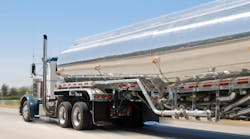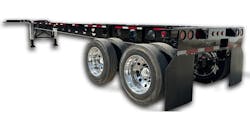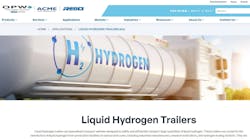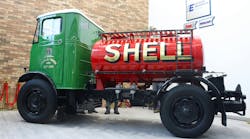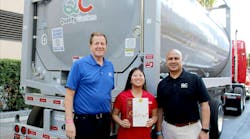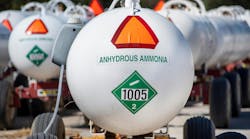For Most of its 60-plus years in business, Benton Oil Company was a Lubbock, Texas-based petroleum marketer. That all changed in 2007 when the owners decided they needed to refocus operations in a different direction.
Petroleum hauling became the primary focus for the company and its 18 petroleum transports. Convenience stores belonging to Benton Oil were leased to new operators, or the property was redeveloped. All but a small amount of the company's wholesale fuels business was sold to another West Texas wholesaler, and Benton Oil bought that company's transportation assets.
“Fuel retailing had become very competitive, due in large part to the big box retailers (like Walmart) that had entered the business,” says Tod A Forbess, president of Benton Oil. “Profits were shrinking for traditional marketers. We began to realize that there were better margins in fuel hauling than in fuel sales.
“From the very outset, Benton Oil had its own trucking operation running under the Petroleum Transport name. Initially, the fleet served just Benton Oil, but for-hire hauling was added over time. Two years ago, we began a significant expansion of the common carrier business that now has become our primary business.”
Phillips jobber
Benton Oil was established as a Phillips 66 Oil jobber in 1948 and was awarded the contract to operate the terminal that Phillips 66 built in Lubbock in 1955. The 7.2-million-gallon terminal is at the southern end of a pipeline extending from the ConocoPhillips refinery in Borger, Texas.
Alan “Chuff” Benton, Tod's grandfather, started the jobbership and laid the foundation for a profitable operation. The terminal contract remains in place today, and Benton Oil is one of the last independent terminal operators in what is now the ConocoPhillips organization.
“We have three employees operating the terminal,” Tod says. “We've retained the terminal contract because we do a good job at a competitive rate.”
As a branded jobber, Benton Oil handled a full line of Phillips 66 automotive products, including lubricants, tires, and batteries. Gasoline and diesel were retailed through Phillips 66-branded service stations, and Benton Oil also built a thriving fuel wholesale business.
Generational change
Giles M “Buddy” Forbess joined the company in the 1960s after marrying Chuff's daughter. He is Tod's father.
Under Buddy's direction, the petroleum jobber achieved steady growth. By the 1990s, the company owned and operated 10 convenience stores in the Lubbock area. The wholesale business grew, as did the petroleum hauling operation, which had three trucks running in 1996. In addition to running the Phillips 66 terminal, Benton Oil had its own bulk plant in Lubbock. The oil jobber also had begun an expansion into automated car washes.
Times were changing for petroleum marketers, though. That was particularly clear to Buddy's sons David (who joined the company fulltime in 1994 after 10 years as a banker in Dallas, Texas) and Tod (who came on board fulltime in 1996 after a decade as an accountant in Dallas).
“The big box retailers started selling fuel in this area in 1996,” Tod says. “Margins for gasoline fell from 14 cents to six cents very quickly. We lost a third of our retail volume that year, and we realized Benton Oil had to change.”
Changed focus
In short order, the petroleum marketer sold three of its 10 c-stores and redeveloped the rest into retail properties. The car wash side of the business grew from one to five locations over the next couple of years. Petroleum hauling operations also grew.
“When Benton Oil was a c-store operator, our trucking division, Petroleum Transport, primarily supported our own stores,” says David, who serves as president of Petroleum Transport. “When we exited the c-store business, we refocused Petroleum Transport as a for-hire petroleum hauler. We realized we could make a better return on investment hauling fuel rather than selling it.
“Petroleum hauling also is a competitive business, but we have built a strong customer base that trusts us. We provide personal service, and we do what we say we will. We want to be a small friendly trucking company, and we have worked hard to keep the small-company feel.”
Even as it emphasizes the small-company image, Petroleum Transport has been growing. The biggest expansion to date came in May 2008 when the parent company Benton Oil handed over most of its wholesale business to Kendrick Oil Company, a marketer based in Fiona, Texas, northwest of Lubbock. In exchange, Petroleum Transport took over Kendrick Oil's transportation assets.
“Kendrick Oil now accounts for about 70% of our hauling revenue,” David says. “This really was a win-win arrangement for all of the parties.”
Customer base
Petroleum Transport's 18 rigs serve a growing customer base that is spread across West Texas and is beginning to extend into New Mexico. Management is planning future expansion into Arizona.
In addition to c-store and truck stop fuel deliveries, the carrier serves a wide range of commercial customers. The Petroleum Transport rigs haul fuel to drilling rigs, farms, cotton gins, and a multitude of small airports and airport fixed base operators. Cargoes include gasoline, distillates, jet fuel, and aviation gasoline.
“We have run dedicated equipment for jet and other aviation fuels since the mid-1990s,” David says. “Over the years, we've become a specialist at serving the aviation market, and that has become an important part of our business.”
Most of the fleet is split between terminals in Lubbock and Amarillo. Petroleum Transport also has individual rigs in Friona and Hereford, Texas. Additional vehicle locations are likely as operations grow in El Paso, Texas, and other communities.
Transports generally operate within a 200-mile radius of home base. Vehicles assigned to the Lubbock area can move five to six loads a day, but transports in other areas may haul no more than one load.
“For instance, transports operating in the Amarillo area may average 60 miles for each trip,” David says. “Transports in other locations have trips of 100 miles or more. Those trucks do just one load a day. Loading rack delays also affect productivity.”
Driver team
Transports are operated for just a single shift each day because Petroleum Transport does no slipseating. “We don't believe slipseating is cost effective for our operation,” David says. “We prefer one driver per truck.”
The carrier hires only experienced professionals to drive its tractors. “We're not the first employers for our drivers,” David says. “We require at least one year of tanker and hazmat experience, and we would like them to have handled refined fuels previously. Someone with no petroleum experience needs two to three weeks of training on the trailer and the loading rack.
“Some of our drivers come from other petroleum fleets in the area, and we're talking with a lot of over-the-road drivers who want more time at home. Virtually all of our drivers are more than 25 years old.”
Attitude plays a big part in the hiring decision. Petroleum Transport looks for driver candidates who are friendly and customer-oriented. They must have a strong work ethic and safety focus with a driving record to back it up.
“Our drivers are our customer-service representatives,” Tod says. “The primary relationship most of our customers have with our company is through our drivers. They are the people from Petroleum Transport and Benton Oil who customers see most of the time.”
Petroleum Transport managers do their best to provide drivers with a good working environment. “We want them to build a career with us, and we try to treat them like we would want to be treated,” David says. “We provide them with excellent, well-maintained equipment. After all, we recognize that the tractor is the driver's office. Each driver has his own tractor, and we let the drivers select equipment like air-ride seats to suit their own tastes.”
Premium tractors
Most of the 18 tractors in the fleet are Peterbilt Model 388 conventionals, and that is all the carrier buys new. The fleet is a mix of daycab tractors and sleeper units with 48-inch sleeper berths. The newest tractors have Cummins engines rated at 450 horsepower and Eaton 10-speed transmissions.
“Almost all of our drivers are home at the end of their day, but we have a small number of overnight trips, and we need the sleeper tractors for those hauls,” David says. “We've been a loyal Peterbilt customer since our father switched to the brand in the 1970s. They build a very good product that has excellent driver acceptance.”
Petroleum Transport buys tractors through West Texas Peterbilt, which has branches throughout the petroleum hauler's operating area. Multiple offices are important because West Texas Peterbilt handles most of the tractor maintenance for Petroleum Transport.
One advantage of buying Peterbilt is the rebate program offered through the c-buying group. Benton Oil and Petroleum Transport have been members of c-buying for at least six years and have found the program to be very beneficial.
“We try to replace our tractors when they reach about 700,000 miles, and the c-buying rebate is a nice savings,” David says. “A tractor in our fleet runs about 100,000 miles a year. We bought four new tractors in 2009, and we bought four the previous year.”
The company also has made tentative plans to buy several petroleum trailers in 2009. The carrier purchased only used petroleum trailers in the past, but management is considering new trailers for the right price.
“We're most likely to buy tank trailers in the second half of the year, probably in the fall,” Tod says. “We only bought used trailers in the past because we always felt we got good value for the money. We buy our trailers through Harmon Tank Co in Lubbock and Trailer & Body Inc in Amarillo. Those two companies also maintain our trailers.”
The equipment purchase plans make it clear that Petroleum Transport and parent company Benton Oil have growth in mind. They have charted a course of steady expansion across the Southwest.
